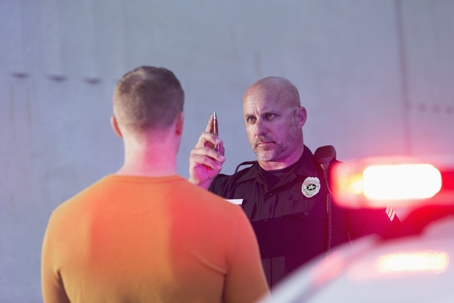One of the most selfish and negligent things that a driver can do is get behind the wheel under the influence of alcohol.
Drunk driving claims more than 10,000 lives each year. This breaks down to about 30 lives a day—that’s one person every 50 minutes who dies in an alcohol-related crash. On top of this, millions more sustain injuries that can cause lifelong debilitations and emotional trauma.
Needless to say, drunk driving is a serious problem across California, particularly in Los Angeles and other populous cities.
If you are ever hit by a drunk driver, it’s incredibly important to take certain steps in order to protect your immediate safety and legal rights in the future.
How Alcohol Affects Drivers
Most of us have heard that drunk driving is dangerous, but you may not know how or why. Driving is something that requires your hands, feet, and eyes to do, all of which are controlled by the brain.
However, alcohol impacts your brain and all the functions that are needed to operate a vehicle. Simply put, consuming alcohol, especially in high quantities, literally makes it impossible to drive with the duty of care, safety, and vigilance that is required of all motorists.
Some of the negative effects that alcohol has on driving include:
Impaired reaction times. Alcohol slows reflexes, which make it difficult to react to changing road situations and make any needed, last-minute driving maneuvers.
Impaired vision. Alcohol slows eye function, alters depth perception, and can cause blurry or double vision.
Impaired concentration. Alcohol increases drowsiness and can reduce attention to the road; drivers can be more susceptible to distractions as well.
Impaired comprehension. Drivers can have difficulty comprehending a situation and deciding what course of action would be the safest.
Impaired coordination. A driver’s hand-eye and foot-eye coordination are reduced by alcohol, making it difficult to take appropriate actions behind the wheel.
What To Do After a Drunk Driving Accident
You may be familiar with the normal steps to take after a car accident. But if you believe you were hit by a potentially drunk driver, you should know how exactly to approach the situation.
Call the police or 9-1-1. No matter how minor the accident seems, always call emergency services to the scene of the drunk driving accident so that both police officers and medical responders can assess the situation and act accordingly. Be sure to mention whether you believe the driver is under the influence.
Remain calm with the other driver. If the other driver is under the influence, you may not know how they will react or if they will become distressed, agitated, or even violent. If the driver is not in a state to hand over their driver’s license and insurance card, make sure to write down other details of the car such as the license plate number and car make and model.
Take note if you suspect intoxication. If you suspect that the other driver is drunk, start collecting physical evidence and taking mental notes of what is happening around you. See if there’s anything telling about their demeanor, write down what they say to you, and look for other signs of drinking, such as empty bottles or the smell of alcohol.
Give a detailed statement to officers. When the police take your statement, make sure you tell them what happened and why you believe that the other driver may be under the influence of alcohol. The police officers can administer DUI tests to determine if the driver is, in fact, drunk and may arrest them if this is the case.
Get medical attention immediately. An ambulance will most likely take you to a local hospital for a medical evaluation and treatment. If not, go see a doctor immediately following the accident. Medical records will be used to show that the drunk driver’s actions directly caused your injuries.
Hire a car accident attorney. You want to make sure you obtain legal representation when filing a civil lawsuit. An attorney does this job every day and has experience with all the strict legal requirements and procedures that must be followed.
Can You Sue a Drunk Driver for Hitting You?
The drunk driver who hit you may have been arrested at the scene and could be facing criminal charges and legal punishments including jail time, fines, and driver’s license suspension.
The good news is that the evidence used in the driver’s criminal case can also be used in your civil lawsuit. Even the fact that the driver was convicted of DUI can show that their negligence was the cause of your accident.
When filing a civil lawsuit, your attorney will gather evidence to show the extent of your compensatory damages, which are meant to “repay” you for your losses. There are two types of compensatory damages for which you can receive compensation: economic and non-economic damages.
Economic Damages
These damages are considered the objective or financial losses you suffered because of the accident. These damages are less likely to be disputed and include things like:
- Medical bills
- Future medical expenses
- Lost wages
- Lost earning capacity
- Property damage
Non-Economic Damages
These can be more subjective, as they require your attorney to paint a picture of just how the quality of your life has been impacted by the accident. You may receive non-economic damages for:
- Emotional trauma
- Pain and suffering
- PTSD and other conditions
- Diminished quality of life
- Lifelong disabilities
Punitive Damages
Punitive damages, also known as exemplary damages, are different from compensatory damages in that they are not intended to repay the injury victim for losses. Instead, they are awarded if it is shown that the defendant (the drunk driver) must be punished as an example to deter similar misconduct in the future.
Insurance covers economic and noneconomic damages, but insurance does not cover punitive damages. Instead, the defendant must pay for them directly as a type of legal punishment for their actions. Your car accident attorney can look at the details of your case and determine if there is enough evidence to qualify for punitive damages.
Can You Sue a Drunk Driver with No Insurance?
Things get a bit more complicated if the drunk driver that hit you turns out not to have the legally-required car insurance. In this situation, you will need to rely on your own uninsured/underinsured motorist coverage (UM/UIM) for compensation. If you do not have this coverage, you may be able to file a personal injury lawsuit against the drunk driver if they have assets. It may also be possible to sue a liable third party, such as the vehicle's owner (if the drunk driver was driving someone else's car), an employer (if the defendant was drunk while driving for their job), or someone who knowingly entrusted their vehicle to an impaired driver. In rare cases, alcohol providers may be held accountable as well, but California law significantly limits third-party liability in alcohol-related crashes. The only exceptions are when a licensed establishment serves alcohol to an "obviously intoxicated minor" (see section 25602.1 of the California Business & Professions Code), or when a parent, guardian, or other adult knowingly furnishes alcohol to minors at their residence and the minor goes on to harm someone.
Get Legal Advocates in Your Corner
We firmly believe that you should not have to pay for your own medical bills, lost wages, and loss of quality of life when your accident was caused by another negligent driver.
If you were injured by a drunk driver, please don’t hesitate to reach out to Effres & Effres for legal representation. Our personal injury attorneys are dedicated to holding responsible parties accountable for their actions and fighting to get injury victims the compensation they deserve.
We have built our firm’s reputation in providing effective, results-driven representation to our clients, all while taking a personalized approach to their unique situations and keeping them informed throughout the entire legal process. Whatever the situation of your accident, we are ready to hear your story and fight for your maximum compensation.
Contact Effres & Effres at (818) 222-9720 to get started with a free consultation.

